#me and josh o’connor have a long and beautiful history
Explore tagged Tumblr posts
Text
this video reminded me of the air dry clay head i made of josh o connor after watching challengers four times and la chimera twice
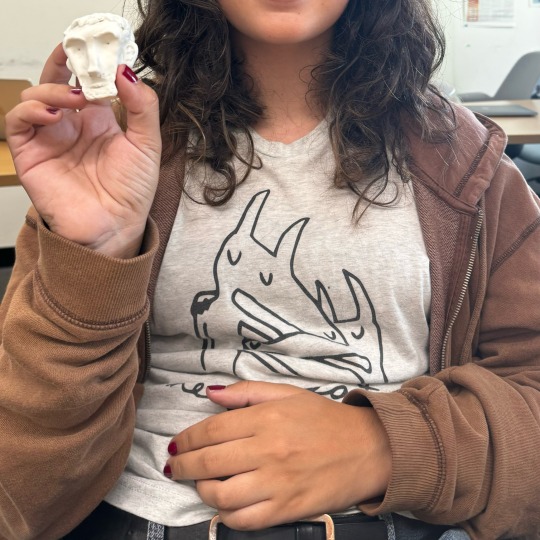

#kendall roy#succession#josh o'connor#challengers#la chimera#me and josh o’connor have a long and beautiful history#it all started when he was in this british show the durrells where he’s the family’s annoying writer son#also when he was in the crown which i watched part of with my mother#most recently i saw gods own country#very good movie by the way#but anyways this is my tiny josh head#it gave me comfort#ava speaks#ava doodles#i should rewatch challengers#art
33 notes
·
View notes
Link
Peter Morgan And Cast On The Multi-Generational Appeal Of ‘The Crown’: “The Queen Is Part Of Our Lives”
By Joe Utichi Editor, AwardsLine June 30, 2020
When it first premiered in 2016, Peter Morgan’s Netflix series The Crown was an instant smash. Aiming to tell the epic story of Queen Elizabeth II’s record-breaking spell as Britain’s longest-serving monarch, starting with her marriage in 1947 and seeing her reign through to the earliest 20th Century, it caught the attention of royalists and republicans alike. Some were hooked by the history and the pageantry, painstakingly researched from detailed court records, and others by the unprecedented psychological detail that showrunner Peter Morgan brought to the saga of the famously tight-knit Windsor family, whose gilded lives have been rocked by scandal and tragedy.
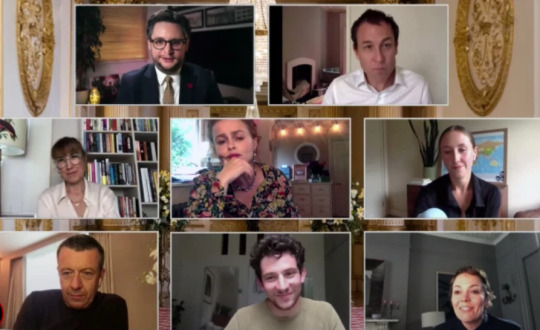
Speaking to Deadline’s Joe Utichi as part of Netflix’s FYSEE TV In Conversation series, Morgan said he was delighted that, after the three successful outings, The Crown was still a ratings draw and en route to a fourth and fifth season. Asked to explain the show’s appeal, he said, “I suppose it’s really her, isn’t it? It’s our fascination with her—the Queen—and the fact that she’s been in everybody’s lives; our lives, our parent’s lives and our grandparents’ lives. She’s been on every stamp in this country [the U.K.], on every bank note, for as long as any of us can remember. So it’s something that doesn’t have a narrow constituency—it speaks to multiple generations and it brings multiple generations together in the process of uncovering it, discovering it and enjoying it. I mean, anecdotally, that’s how I gather people are watching it—they’re often not watching it in the way they would traditionally [watch it], they’re often watching it with other members of their families, or with people of different generations, and that’s lovely.”
One of the original show’s many fans was Olivia Colman, who, for Season Three, took over the role of Queen Elizabeth from Claire Foy. Despite having recently won an Oscar for portraying 18th Century Queen Anne in 2018’s The Favourite, Colman admitted to having reservations about her ability to portray one of the most famous women in the world today. “It’s definitely more daunting to play someone that everyone knows,” she said. “The beauty of Queen Anne is that no one can tell me she didn’t sound like that, but everyone can tell me what the Queen sounds like, and that’s slightly annoying… It’s much harder to play people that everyone has a vision of, a picture of, and has ideas about. I’ve never joined a show that’s already been up and running and successful. But I was such an enormous fan of the show that I didn’t really think about it.”
Joining Colman, and the cast, was Tobias Menzies, who took over from Matt Smith as Queen Elizabeth’s husband, Prince Philip. Like Colman, Menzies had been a fan of the show and knew that, with Morgan at the helm, the standards would remain high. “I wasn’t surprised about the quality of the scripts,” he said, “because I had really admired what Peter had done with the previous cast for the first two seasons, and the scripts we were being sent seemed really of a piece with all of that. That’s Peter’s genius: weaving together the very public and the very private, and that’s sort of the magic of the show, really. I have to admit, I didn’t really know a great deal about the Royal Family going in to this show—they’re not a family that I particularly had paid a lot of interest to. [But] I think what the show does really well, even for people who maybe aren’t necessarily that interested in the Royal Family, is that it takes you into the decisions and the challenges of trying to live as a family in this institution. The continual frustrations, the challenges, and sometimes a privileges and joys of this very peculiar—and acutely British—institution.”
Season Three also saw the introduction of Helena Bonham Carter as Princess Margaret, Queen Elizabeth’s older, and only, sibling. Long before the tabloid stories that defined Queen’s “annus horribilis” of 1992, Princess Margaret had been a one-woman scandal sheet of her own back in the day, culminating in a much-publicized marriage breakdown in 1976. Bonham Carter praises the show for portraying Princess Margaret as a woman first rather than a figurehead.
“I think the reason this show has been so successful is because we’ve all taken [the Royal Family] for granted,” Bonham Carter said. “We’ve all thought that they were just [cardboard] cut-outs, and the surprise is, ‘Oh my God—of course [they aren’t].’ What must they have felt? They had a human experience through all these different events. Princess Margaret did get divorced, but [people] didn’t really think about [her feelings]. And when you’re playing somebody from the inside, from that perspective, you realize how hard it is to go through a divorce in public, to be that vulnerable and experience all sorts of things that come with divorce when you are you are in full view of the entire world.”
The Crown, she decided, was “the story of an ordinary family in extraordinary circumstances”. “And, ultimately,” she continued, “it’s not a place to be if you are suffering, it’s not a place for any individuality. Duty and responsibility come first, and it doesn’t allow for much fallibility or humanity, or human foible.”
By Season Three, two of Queen Elizabeth’s children had become young adults, which saw the arrival of Josh O’Connor as Prince Charles and Erin Doherty as Princess Anne. O’Connor praised the show for its unpredictability, even when dealing with well-known historical events. “I didn’t know much about anything [to do with the Royal Family] to be honest,” he joked, “so everything was a surprise! But I think the surprising thing, as always in The Crown, is that the unexpected [version of the story] is what’s told. There were certain stories that you look back at and you go, ‘Well, you can’t not tell that story—but how can you tell it in a more interesting way, or from an angle that hasn’t been seen before?’”
For Doherty, the chance to play Princess Anne, arguably the saltiest of the Windsor family after her father, was a dream come true. “For me, [Anne] is the furthest person away from my natural personality that I’ve ever been given the opportunity to play,” she said. “What it is with her that I think is fascinating is that she just doesn’t really give a crap about what anyone thinks—she’s just so honest with her emotions. And it’s so rare to be able to play someone who just tells the truth, without faffing about.”
Director Jessica Hobbs, who helmed two of the Season Three’s episodes, paid testament to Donerty’s commitment to the role. “I remember seeing her test audition,” she laughed. “Peter showed it to me. I was doing some work with him and he said, ‘Come and have a look at who we’re looking at for Anne,’ and it was just this raw contemptuous fury. I was, like, ‘God, she’s perfect.’ Absolutely perfect. And Erin never faltered from that. It was pretty joyful to watch.”
To see more from Peter Morgan and The Crown’s creative crew, watch the video.
youtube
#olivia colman#queen elizabeth ii#tobias menzies#helena bonham carter#the crown#josh o'connor#peter morgan#erin doherty#the crown netflix
57 notes
·
View notes
Text
Playbill: 5 Reasons We Can't Wait to Watch the Les Misérables Miniseries on PBS
Dominic West, David Oyelowo, Lily Collins, Olivia Colman, and more star in the epic new dramatic adaptation from MASTERPIECE.
Great stories demand to be told and retold, generation after generation finding fresh relevance in stories of love and redemption. And certainly Les Misérables, Victor Hugo’s epic novel of love, revolution, and crushing poverty, is among them.
And though you may think you know the story of Jean Valjean, Javert, Fantine, and the rest from the blockbuster stage musical and its film adaptation, there’s so much more to Hugo’s story. And much of it will be on display in PBS’ new six-part miniseries, premiering April 14 as part of MASTERPIECE.
Here are five reasons we can’t wait to see the sumptuous new version.
The Cast The Wire star Dominic West (who has been seen on Broadway in Design for Living and in the West End in Les Liaisons Dangereuses) serves as executive producer and stars as Jean Valjean, whom he refers to as a superhero: “He’s tougher than everybody, he’s kinder than everybody, he’s more generous than everybody and a bigger heart and a bigger hero in terms of what the personal demons he’s trying to overcome.”
Joining him is David Oyelowo, who wowed New York audiences in 2016 with his Othello, and brings a fresh perspective to Javert, who mercilessly hunts Valjean over decades. Also an executive producer on the miniseries, Oyelowo was delighted to explore more the complexities with which Hugo imbued Javert in the original novel.
And that’s not to mention a stacked supporting cast, starting with Lily Collins as Fantine, newly minted Academy Award winner Olivia Colman (The Favourite) as Madame Thénardier, Ellie Bamber as Cosette, and Josh O’Connor as Marius.
The Brand-New Adaptation Freed from the constraints of staying within a classic two-act structure, screenwriter Andrew Davies was able to dig deeper into the characters and situations, bringing to life aspects and scenes from Hugo’s novel that even diehard fans of the musical won’t know.
As MASTERPIECE executive producer Rebecca Eaton puts it, there are moments in the miniseries that go even deeper into the characters audiences have long loved. She pointed to one specific moment, after Fantine is pregnant, where her lover and his friends take Fantine and hers out to lunch on a beautiful day. At the end of the meal, the men stand and simply abandon the women. “The contrast of a beautiful day, beautiful young women and these guys leaving them, and leaving them to a tragic fate, to me is just a brilliant use of drama and lighting and production design to highlight an emotional moment,” Eaton said.
A Fresh Look at Old Favorites We all know and love Fantine, her daughter Cosette, and the Thénardiers—but there’s so much more to their story than those unfamiliar with the novel might know.
“What’s wonderful about the musical is the characters and the love stories that exist between the characters,” West said, “and so we go into more depth into those love stories and those relationships. And I think you get to see… where the Thénardiers are coming from. I particularly love the Thénardiers in our production.”
Plus, as many involved with the miniseries point out, Fantine’s time in other versions is often quite short. Here, the grinding down of her spirit that leads her to sell her hair and teeth is a much more gradual process, making it even more painful to experience with her.
“I'm taking a character that everyone seemingly knows and loves but at the same time showing a new side to her,” Collins said. “So that was an exciting twist on it for me.”
Collins pointed out that audiences are used to encountering Fantine after she’s taken work at the factory, and so they’re unfamiliar with the carefree girl she was.
“To take a character further into their back story and show people that, I think it creates a bigger amount of empathy for them throughout their character arcs,” she said. “So for me, specifically, you really get to see Fantine at her youngest, most vibrant, which is a perfect comparison then to when she’s dying and at her worst, because you can only have empathy for someone to a certain extent if you haven’t experienced the higher notes with them.”
The Scope Les Misérables the musical is certainly not a chamber piece, but it is fairly streamlined in terms of storytelling compared to Hugo’s novel. Davies, however, brings a whole new scope to the work with this adaptation, one that finds fresh emphasis on the lives of the poverty-stricken in the 19th century.
“I read the book [and] I just thought it would be great to put this on the screen,” Davies says. “And what I initially thought was how much it spoke to us today, with London full of homeless beggars sitting in the rain while rich people step over them on their way to the opera. I was thinking, ‘You know, Hugo’s world is very similar to ours.’ I guess the difference is we don’t seem to be about to have any kind of revolution, even an unsuccessful one.”
The Production Values No expense was spared in recreating life in 19th-century France, and the results are stunning. Not just for the audience—the performers have spoken about how easy it was to slip into another world when they arrived on the set in full costume.
“What’s great about acting in these shows on an epic scale is you get to time travel,” West said. “I love history and I love trying to imagine the past and it’s very easy when you’ve got great artists who have created it all for you.”
Oyelowo points out how evocative the visual storytelling is. “Thomas Shankland, our director, did a brilliant job of making the show have an energy and a kinetic, visceral feel to it that it’s not your sort of chocolate box period drama,” he says. “It’s got real teeth, it’s got real dirt, it’s got real grime, an edge to it."
Les Misérables on MASTERPIECE premieres Sunday, April 14 at 9/8c on PBS. The show will also stream on PBS.org and on the PBS Video App.
3 notes
·
View notes
Link
Josh O’Connor may best be known for this breakthrough role in 2017’s God’s Own Country but the Southampton-born actor has been cultivating a catalog of great film and television performances for years. From The Riot Club and The Program in film and Doctor Who, Peaky Blinders, Ripper Street and The Durrells on TV, O’Connor has built a resume that made him the perfect choice to play the most challenging role of his career, Prince Charles in season three of Netflix’s The Crown. O’Connor play the Prince of Wales at a turning point in the would be king’s life, from the early years of his relationship with Camilla Bowles (the Diana years will show up in season four) to the daunting task of figuring out how to lead the commonwealth when the time comes.
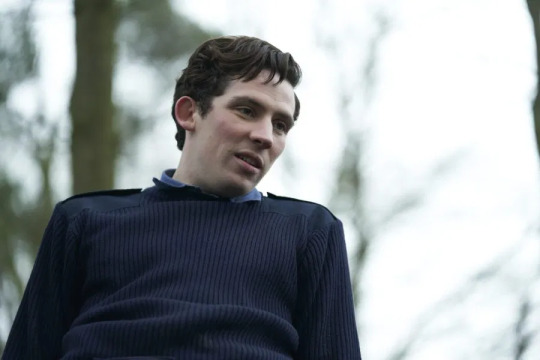
I caught up with two-time BIFA winning actor to talk about God’s Own Country, his role in The Crown, what he likes and doesn’t like about biopics and playing real people and Todd Haynes’ I’m Not There.
I wanted to start by talking with you about God’s Own Country, which quickly became a cornerstone of queer cinema, and I think took off in a way most people weren’t expecting. Can you tell me a little bit the impact working on that film had for you?
It was a kind of monumental moment for me and I think a big moment for queer cinema and insofar as it was kind of a gay love story that we hadn’t seen before, you know, in terms of one that ended with hope and one that told a kind of positive story. It was something maybe we’d seen before, but, it’s rare and people were obviously hungry for that. And so it touched many people and I feel like it’s rare that your project gets to have that effect on people. So it was a kind of, it was a huge moment for me. In terms of kind of career wise also just as a creative, as an actor, I think it was a moment of realization about technique and how I want to work. It built a process, which I still use the basis of now. And so yeah, it was really impactful for me.
I love that. Earlier this year you had Emma., how was it stepping into Mr. Elton’s shoes?
(laughs) It was very different than anything I’ve done before. I’ve never done comedy before. Autumn de Wilde, who is an exceptionally talented director, came in and it was very clear she wanted a kind of Peter Cook-esque Mr Elton and we’ve talked about him having a sort of darker side, which we touch on in the film. I think it was real, I loved it, it was kind of getting to stretch my muscles, my comedic muscles I suppose. And yeah, it was a real treat and it’s a lovely, beautiful ensemble film.
Diving into The Crown, had you watched the first two seasons of the show to help inform you of the style or approach to the series?
Yes, I had. I’d seen the first two and I’m very good friends with Vanessa Kirby who played Margaret so, I initially watched it as a kind of support for my friends, but then absolutely, obviously got hooked and I think the first two series’ are exceptional. Claire Foy is kind of spellbinding, Matt Smith I think is extraordinary as Philip, and often sort of, it’s underplayed how brilliant he was. I absolutely loved it and then be a part of this group of actors who I totally adore and look up to, you know, the likes of Tobias Menzies, to go from Matthew is extraordinary, and Olivia Colman and Helena Bonham Carter, you know, these are all people that I aspire to so it’s been a real treat.
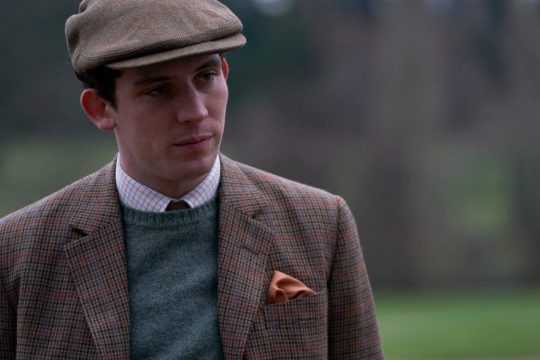
What were the main sources and figuring out who Prince Charles is on a personal level?
Well, I think there were a few things to kind of brought out the personal, but initially when I started with Charles, I spent so much time watching footage of him, or hearing recordings of him from the period. After a while I got to the point where I was like, actually, I don’t know that this has helped. It certainly isn’t helping me get any closer to the character and certainly isn’t getting close to who Charles really is behind closed doors. And so I sort of threw all that out the window. The thing that got me there more than anything was something that Peter Morgan had written, which is I think episode eight of series three. Charles described his life as being like he as being like a character in Dangling Man. He says, the character is a working class blue collar guy from Chicago and he’s waiting to be drafted to go to war and he actually wants to be drafted because it’ll give his life meaning, even though it means that they’ll go to a certain death.
And the idea that Charles, Prince Charles is this young boy who’s actually waiting for his own mother to die in order for his life to take meaning, I just thought that was a kind of, it locked into a sort of tragic narrative of this young boy that is so rare and an extraordinary. So that was the kind of, that was the crux of it.
When you’re playing somebody that is so well known, how do you strike the balance between impression and interpretation and what do you think you brought to Prince Charles?
Yeah, that’s such a good question. It’s a question I don’t know the answer to, yet. The best way to, for me, in my personal view of it as an audience member, is that I never enjoy seeing in any kind of biopic or whenever I see an actor playing a real person, I find it very difficult to watch and actor to do something really exactly like the person.
I don’t know why. I think it becomes too much like an impression. And what I always loved is that there was a great film called I’m Not There, which is about Bob Dylan. And so it was like eight or nine actors playing Dylan at different stages in his life and not just different stages but playing different aspects of his personality. So Cate Blanchett, plays the kind of more recognizable Dylan, which is the sort of public eye Dylan, you had Heath Ledger playing the kind of rock and roll Dylan, you had a young actor [Marcus Carl Franklin] playing the Woody Guthrie influenced Bob Dylan. So you had all these different actors, all totally different and most of them looked nothing like and resembled him in no way. And I remember that was the most powerful representation of Dylan I’ve seen or of anyone I’ve seen and I thought when I’m playing Prince Charles there’s no point in me spending all this time trying to get his voice and trying to look like him and walk like him.
Those things will happen naturally. And I think, you know, it’s good to have little aspects and little notes that people feel safe and comfortable in the knowledge secure that you are playing Prince Charles. But as soon as you can get rid of those, the earlier you can get rid of those, the the more interesting and the more adaptive that character is, the more influential that character can be. And as I say, it’s more interesting seeing Josh play Prince Charles than it is seeing just seeing Prince Charles.
I love that example of I’m Not There. It’s a brilliant movie and it is such a great way to bring an audience into a character without feeling like you’re just watching video footage.
Exactly. Because there’s documentary. We also undersell the brilliant art form that is documentary, which I absolutely adore it. There’s nothing better than watching old footage of Charles. I love it. But it’s not the same. I want to see an actor play and Claire Foy is a great example. I should stop rambling but Claire Foy is a great example of an actress who plays the queen so stupendously everyone in the world sat up right when they watched Claire and Matt Smith in series one and two. And it wasn’t because there was, ‘Oh my God,’ she looked and speaks exactly like the queen at that age. Most of us don’t know what the queen looked like at that age and it sounded like at that age because there wasn’t very much TV. So actually all we’re looking at is an incredible performance of the character. And I think I remember watching Claire and Matt and thinking ‘let’s focus on that.’ Let’s not try and play Prince Charles, let’s try and play the character.
Again, that’s a perfect example that makes perfect sense. There’s a turning point in the series when Charles, as the Prince of Wales, has to learn to speak Welsh. Did you know any Welsh or was this something new for you as well?
I mean, I certainly knew no Welsh. I’d never spoken a word of Welsh in my life a lot. I’d heard the language. One of the most kind of influential or most magical moments from when I was in grammar school was I heard an old recording of Dylan Thomas reading Under Milk Wood and was a beautiful radio play that he wrote and it was and poetical and beautiful and Dylan speaks it in this kind of like raucous Welsh voice. It’s like, mind blowing, and it was a kind of really special moment. So that combined with the fact that I love Wales the country, I felt very great affinity for the Welsh language. But as I said, I had no idea. So it’s very much, it was very much kind of like Charles’ feelings about having to learn it. There were muffs the same as mine and we went through a long process of learning everything. And yeah, I mean it’s great. I still know the speech now, but I don’t know what it means.
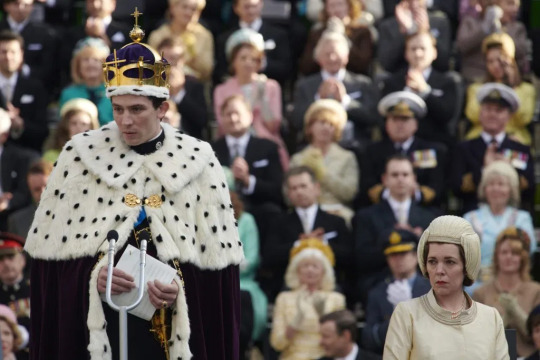
Which brings us right to that monumental episode where you have to give the speech for his investiture. Tell me about that sequence, which I think is just extraordinary in this series.
It’s a beautifully written episode. It has so much significance because it’s about Charles stepping up and becoming an adult. To me it was the thing that convinced me to take the role in the first place. I suddenly realized this as a young man who is, in my in recent history, is kind of known as a bit of a wally [British slang for ineffectual or foolish]. He goes around and talks about the environment, which of course we all know he was right. In the 80s and 90s he was considered a bit of a buffoon. And then there’s the Diana years and the thing that got me and took and basically convinced me to take the role was I suddenly realized he’s a lost boy and the investiture episode is him taking that lost boy and going, ‘No, I’m going to own this and I’m going to become a man.’
Jumping off that a bit, what do you think was the most misunderstood thing about Charles from this period of his life?
I think sort of the misunderstood thing of most of the Royal families, is that they had some perfect childhood. I mean, in terms of financially, they probably had a pretty great childhood, but I think terms of relationships to parents, relationships to siblings, they’re just like anyone else. I mean, they’re difficult. They have their ups and their downs. He was a lost boy but a lost boy with the knowledge that he was going to have to at some point lead, be the king, the reign of England, of the Commonwealth of this huge empire and we now know, it’s taken an entire lifetime and he still isn’t the King.
I think that’s the biggest thing that hopefully people have taken. There’s been a great response within people calling out and saying they feel great sorrow for Charles now. So hopefully that’s what they’ll take.
In looking forward to the future of your career, do you have a dream role in mind that you’d like to play?
I don’t know actually. It’s one of these questions that so hard because I’m always surprised when I say something quick and then a script will come through with a totally original role and there’s nothing better than a new script and a role that you’ve never thought of. It grabs me. But I suppose there are plenty of performances I’ve always kind of aspired to like Daniel Day-Lewis has played and those kind of fully formed characters or Tom Hanks. Those are the kinds of roles that you dream of. In terms of theater it’s easy because everyone wants to play Richard II or Hamlet. I’ve always wanted to play Richard II, so one day hopefully I’ll be able to do that. But beyond that, certainly the dream is to keep getting to play new characters and work with great directors.
All seasons of The Crown, including S3 where Josh O’Connor appears, are streaming exclusively on Netflix.
21 notes
·
View notes